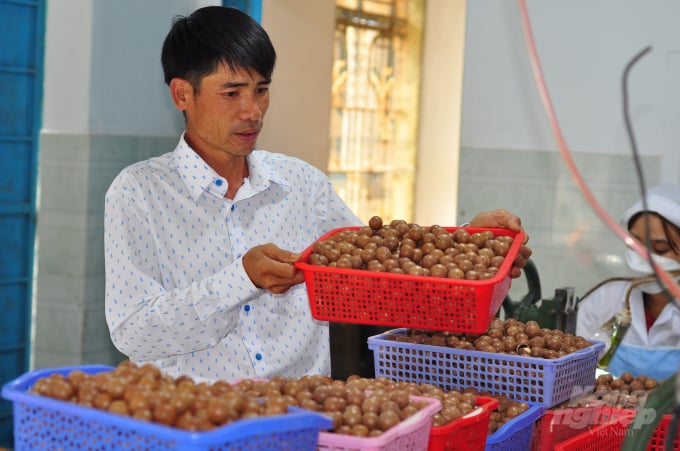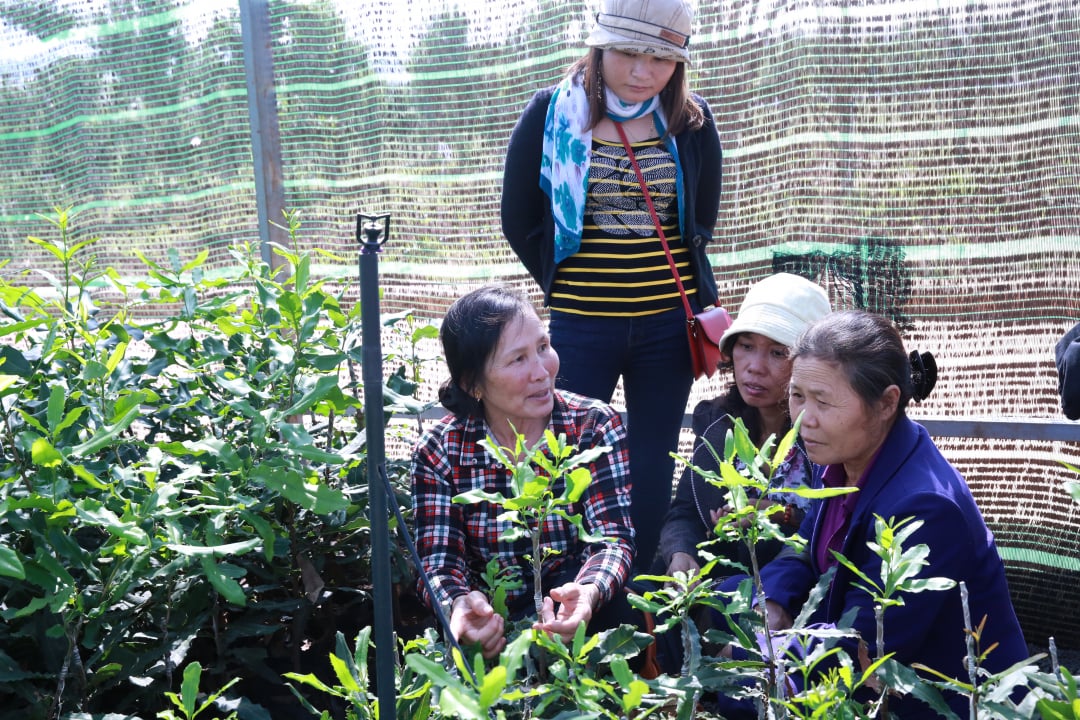June 6, 2025 | 11:04 GMT +7
June 6, 2025 | 11:04 GMT +7
Hotline: 0913.378.918
June 6, 2025 | 11:04 GMT +7
Hotline: 0913.378.918
On March 15, Deputy Prime Minister Le Van Thanh signed Decision No.344 authorizing the Macadamia Sustainable Development Scheme for the period 2021-2030, with a vision to 2050.
According to the Scheme, macadamia is developed into a productive and sustainable crop that contributes to the realization of the Strategy for Sustainable Agriculture and Rural Development in the period 2021-2030, with a vision to 2050, while ensuring socio-economic development, environmental protection, national defense and security.

The project aims to export macadamia to reach USD 2.5 billion by 2050. Photo: VAN.
Production of processed macadamia nuts is predicted to reach 130,000 tons in 2030 and 500,000 tons in 2050.
The export value of macadamia goods will reach around USD 400 million in 2030 and approximately USD 2.5 billion in 2050, of which the proportion of whole macadamia products does not exceed 40%.
According to the orientation, the macadamia tree planting area nationwide will grow to 130,000 to 150,000 ha by 2030, with a concentration in the provinces of the Northwest (approximately 75,000–95,000 ha, primarily in Dien Bien and Lai Chau), the Central Highlands (approximately 45,000 ha, primarily in Lam Dong, Dak Nong, and Kon Tum), and a number of localities with climate and soil conditions suitable for macadamia tree (around 10,000 ha). MARD and local governments defined the precise scale and locations after thoroughly examining the potential, investment capacity, and land fund to ensure economic, social, and environmental as well as market demand efficiency.
After reviewing and analyzing the efficacy of macadamia development from 2021 to 2030, precise recommendations will be made on the size and area of macadamia plantations by 2050, with the goal of reaching around 250,000 hectares.
By 2030, economic components are encouraged to invest in the establishment of macadamia pre-and post-processing facilities nearby to material planting areas in the Northwest and Central Highlands; upgrading 65 existing pre-and post-processing facilities and constructing another 300-400 new ones with an annual capacity of 100-200 tons of nuts, and facilitating enterprises' investment in the construction of approximately 8 deep-processing plants for high-value macadamia nuts.

According to the orientation of the Scheme, the size of the macadamia area in the whole country will reach from 130,000 to 150,000 ha by 2030. Photo: VAN.
The state is encouraging businesses to collaborate with farmers to produce macadamia through cooperative and cooperative groups in concentrated macadamia planting regions, so establishing a macadamia commodity chain from production to processing and consumption.
Scientists assist communities in identifying optimal macadamia-producing regions for each strain/variety; they also convey science and technology to families and enterprises for planting, care, harvesting, preliminary processing, and processing.
To develop the consumption market and provide solutions for the domestic market, local governments should support the development of a macadamia product brand associated with the geographical indication; it is critical to participate in promotional activities, communication, and product introduction to educate domestic consumers about macadamia products.
For the export market, localities will continue to work closely with ministries, the Vietnam Macadamia Association, and enterprises to expand export markets and remove trade barriers; they will concentrate on implementing measures to promote the official export of whole shelled macadamia nuts and kernels, as well as deep-processed macadamia products, to other foreign markets...
Translated by Linh Linh

(VAN) VAAS and numerous Vietnamese enterprises have signed cooperation agreements with Japanese partners to promote agricultural technology and trade connectivity.
/2025/05/29/5625-12-214801_567.jpg)
(VAN) Provincial mergers in the Mekong Delta promise to streamline administration, expand inter-provincial raw material areas, and foster close linkages in agricultural value chains, benefiting both businesses and cooperatives.

(VAN) Merging Mekong Delta provinces contributes to the expansion of agricultural raw material areas, addressing previous constraints caused by provincial boundaries. Additionally, this expansion will reduce costs and strengthen linkages between businesses, cooperatives, and farmers.
/2025/05/29/1043-2-153730_145.jpg)
(VAN) The Government's policy to merge provincial-level administrative units opens up major opportunities for the Mekong Delta region to reshape its agricultural development strategy toward large-scale production, effective regional linkages, and sustainability.

(VAN) The mutual export of agrifood products between the European Union (EU) and the United Kingdom (UK) must occur again without certification, border controls or other red tape. This was agreed at the UK-EU summit.
/2025/05/22/5121-2-173645_677.jpg)
(VAN) NBSAP Tracker identifies strengths and areas for improvement in the National Biodiversity Strategy, based on each region’s priorities and capacities.

(VAN) The draft amendment to the Circular on rice export trading stipulates a periodic reporting regime for rice exporting enterprises.